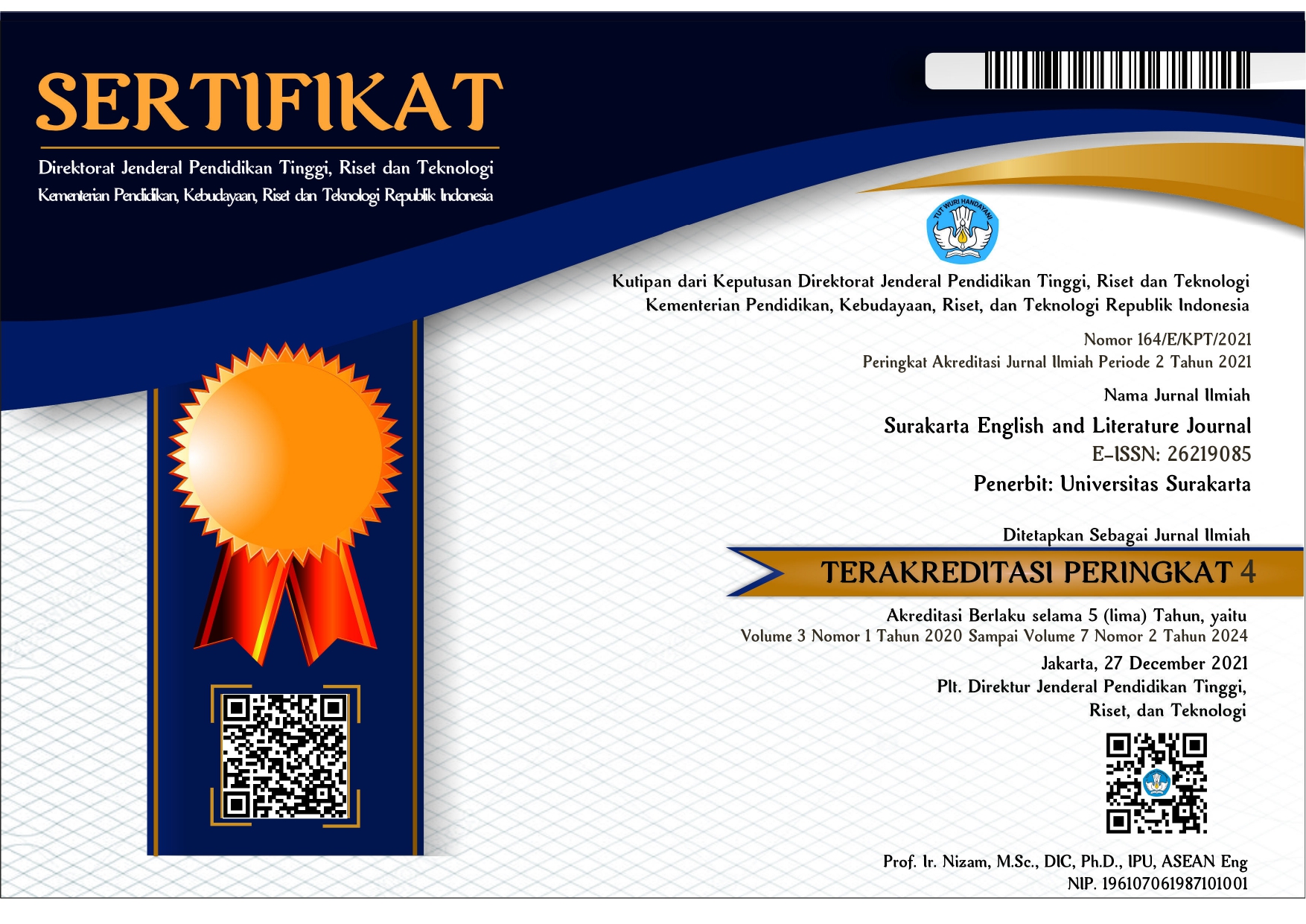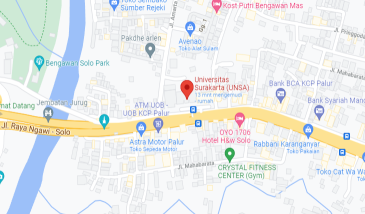Project-based English Learning to Increase Student’s Motivation and Learning Achievement
DOI:
https://doi.org/10.52429/selju.v7i2.172Keywords:
Project Based Teaching and Learning, Learning Outcome, English Teaching, Learning MotivationAbstract
This quantitative experimental design research was aimed at finding out whether a project-based English teaching and learning activity affects the student's learning outcomes and motivation. A pretest and a post-test were given to know the students' skills before and after they joined the project-based teaching and learning process. The project was in the form of asking the students to cook any food on their preference in which they had to use English before, during, and after the process. The respondents were 11 female students which were chosen by using a simple random sampling technique. The result of the research was that the six respondents stated that they strongly agreed that project-based English teaching and learning increased their learning motivation. In addition, 5 respondents stated that they agreed. Hence, no respondents said that it was not motivational. The research also showed that there was a significant increase of 13 points in the average score between the pretest and post-test results. It means the use of project-based teaching and learning activity was scientifically proven to be effective in increasing the student's learning motivation and outcome.
References
Almulla, M. A. (2020). The Effectiveness of the Project-Based Learning (PBL) Approach as a Way to Engage Students in Learning. SAGE Open, 10(3), 2158244020938702. https://doi.org/10.1177/2158244020938702
Damayanti, S. A., Santyasa, W., & Rai, dan A. A. I. A. (2020). PENGARUH MODEL PROBLEM BASED-LEARNING DENGAN FLIPPED CLASSROOM TERHADAP KEMAMPUAN BERPIKIR KREATIF. Jurnal Kependidikan: Penelitian Inovasi Pembelajaran. https://api.semanticscholar.org/CorpusID:219664829
Ferawati Wahida1 & , Nurdin Rahman, dan Siang Tandi Gonggo. (2025). PENGARUH MODEL PEMBELAJARAN BERBASIS PROYEK TERHADAP KETERAMPILAN BERPIKIR KREATIF DAN HASIL BELAJAR SISWA KELAS X SMA NEGERI 1 PARIGI. Jurnal Sains Dan Teknologi Tadulako, 4(3). http://jurnal.untad.ac.id/jurnal/index.php/JSTT/article/view/6949
Hamalik, O. (2000). Psikologi belajar dan mengajar. PT Sinar Baru Algensindo. https://books.google.co.id/books?id=tYOVtQEACAAJ
Helmiati, W. (2016). PENGARUH MODEL PEMBELAJARAN BERBASIS PROYEK TERHADAP KREATIVITAS SISWA PADA PEMBELAJARAN SENI TARI KELAS VIII SMP. JurnalPendidikan dan Pembelajaran Khatulistiwa. https://jurnal.untan.ac.id/index.php/jpdpb/article/view/17830
Ir. Syofian Siregar, M. M. (2017). Metode Pemilihan Kuantitatif: Dilengkapi dengan Perbandingan Perhitungan Manual & SPSS. Kencana. https://books.google.co.id/books?id=IjTMDwAAQBAJ
Kokotsaki, D., Menzies, V., & Wiggins, A. (2016). Project-based learning: A review of the literature. Improving Schools, 19(3), 267–277. https://doi.org/10.1177/1365480216659733
Made, I., Jagantara, W., Adnyana, B., Luh, N., & Widiyanti, P. M. (2014). PENGARUH MODEL PEMBELAJARAN BERBASIS PROYEK (PROJECT BASED LEARNING) TERHADAP HASIL BELAJAR BIOLOGI DITINJAU DARI GAYA BELAJAR SISWA SMA. In Journal Program Pascasarjana Universitas Pendidikan Ganesha Program Studi IPA (Vol. 4).
Nurhayati, N., Herawaty, N., Juliani, A., & Elizabeth Patras, Y. (2023). Implementasi Model Pembelajaran Problem Based Learning (PBL) terhadap Peningkatan Literasi Siswa Melalui Metode Content Analysis. Jurnal PGSD: Jurnal Ilmiah Pendidikan Guru Sekolah Dasar, 16(2), 85–97. https://doi.org/10.33369/pgsd.16.2.85-97
Preeti, B., Ashish, A., & Shriram, G. (2013). Problem Based Learning (PBL)—An Effective Approach to Improve Learning Outcomes in Medical Teaching. Journal of Clinical and Diagnostic Research : JCDR, 7(12), 2896–2897. https://doi.org/10.7860/JCDR/2013/7339.3787
Rafik, M., Febrianti, V., Nurhasanah, A., & Muhajir, S. (2022). Telaah Literatur: Pengaruh Model Pembelajaran Project Based Learning (PjBL) terhadap Kreativitas Siswa Guna Mendukung Pembelajaran Abad 21. Jurnal Pembelajaran Inovatif, 5, 80–85. https://doi.org/10.21009/JPI.051.10
Rahayu, G., & Nugraha, F. (2018). EFFECT OF COOPERATIVE LEARNING MODEL TYPE TEAM GAME TOURNAMENT (TGT) ON CROSS-CULTURAL SKILLS IN LEARNING SCIENCE SOCIAL KNOWLEDGE IN PRIMARY SCHOOL. PrimaryEdu - Journal of Primary Education, 2, 63. https://doi.org/10.22460/pej.v1i1.671
Riska Wulandari. (2021). Characteristics and Learning Models of the 21st Century. Social, Humanities,and Education Studies: Conference Series, 4(3). https://doi.org/10.20961/shes.v4i3.49958
Sardiman, S. A. (2004). Interaksi & motivasi belajar mengajar. Rajagrafindo Persada (Rajawali Pers). https://books.google.co.id/books?id=an8MMwEACAAJ
Setyowati. (2007). PENGARUH MOTIVASI BELAJAR TERHADAP HASIL BELAJAR SISWA KELAS VII SMPN 13 SEMARANG. Unnes.
Titik Ismailia. (2021). PERFORMANCE ASSESSMENT USING RUBRIC TO IMPROVE STUDENTS’ SPEAKING SKILL. Journal of Applied Linguistics and Literacy, 5(2). https://jurnal.unigal.ac.id/index.php/jall/index
Warsono. (2017). Pembelajaran Aktif Teori dan Asesmen. https://api.semanticscholar.org/CorpusID:187352562
Wena, M. (2010). Strategi Pembelajaran Inovatif Kontemporer: Suatu Tinjauan Konseptual Operasional. https://api.semanticscholar.org/CorpusID:70016686
Widiasworo, E. (2017). Strategi & metode mengajar siswa di luar kelas (outdoor learning) secara aktif, kreatif, inspiratif, dan komunikatif. https://api.semanticscholar.org/CorpusID:217222180
Wulandari. (2020). Pengaruh Model Pembelajaran Project Based Learning Terhadap Hasil Belajar Tematik Kelas IV. 2020, 3(1), 45–52.
Yusika, I., & Turdjai, T. (2021). PENERAPAN MODEL PEMBELAJARAN BERBASIS PROYEK (PjBL) UNTUK MENINGKATKAN KREATIVITAS SISWA. Diadik: Jurnal Ilmiah Teknologi Pendidikan, 11(1), 17–25. https://doi.org/10.33369/diadik.v11i1.18365
Downloads
Published
How to Cite
Issue
Section
License
Copyright (c) 2024 Suryanti Galuh Pravitasari

This work is licensed under a Creative Commons Attribution-ShareAlike 4.0 International License.
Licensing for Data Publication
-
Open Data Commons Attribution License, http://www.opendatacommons.org/licenses/by/1.0/ (default)
-
Creative Commons CC-Zero Waiver, http://creativecommons.org/publicdomain/zero/1.0/
-
Open Data Commons Public Domain Dedication and Licence, http://www.opendatacommons.org/licenses/pddl/1-0/














